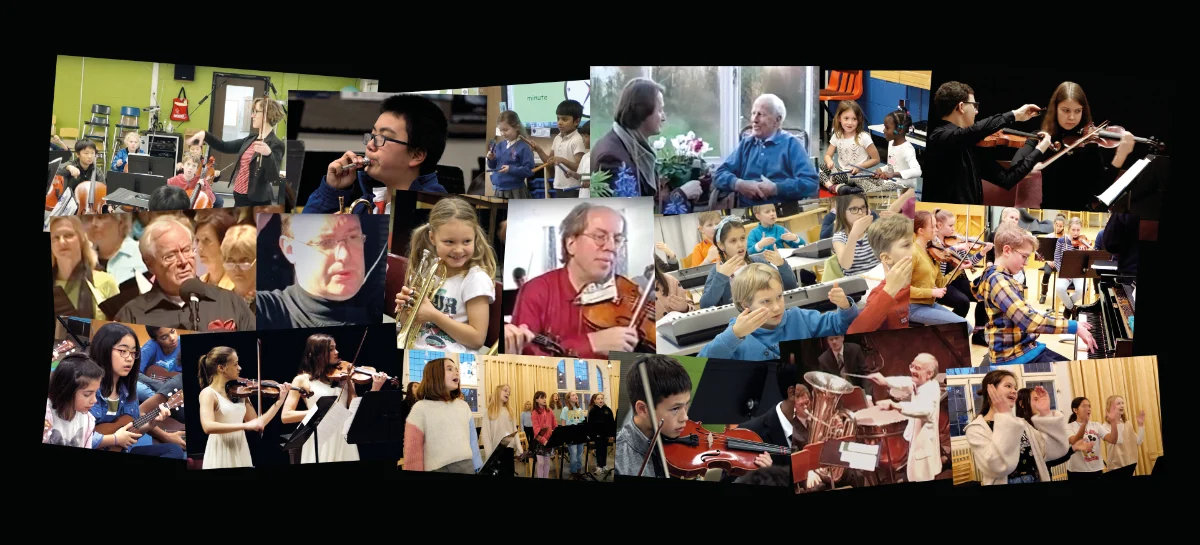From Bullet to Fiddle
“From Bullet to Fiddle” is the title concept of a Scientific Study posing the following question: Music making in many class-rooms, what could happen?
The purpose of the Study:
- An overall view of the changes in society if all children had the DAILY chance to make music together, ie: playing instruments/ singing as part of their school-day;
- To ascertain how music-making can affect study motivation and study results, school atmospheres, social problems, and cultural life.
INTRODUCTION FILM
SHORT VERSION INTRODUCTION FILM, 3 min, 09 s:
A film focusing on the principal concept of the Study “From bullet to fiddle”.
MAIN INTRODUCTION FILM, 11 min, 30 s:
The film presents the Study “From bullet to fiddle” including presentation of Göran Staxäng, director Festival & Forum 21; a fragment from a rehearsal with Kremerata Baltica and Gidon Kremer; music making in schools; interviews and fragments of talks with:
- Violinist Gidon Kremer (Latvia);
- Professor Maria Spychiger, Switzerland (presently Professor at “Hochschule für Musik und Darstellende Kunst, Frankfurt am Main);
- Professor Katri Saarikivi (Helsinki University);
- school principals from Ann Arbor, East Helsinki Music Institute, Kalix (Sweden) and Watford (England);
- music teachers from Ann Arbor (Michigan, US), East Helsinki Music Institute (Finland), Kalix (Sweden);
- students from Ann Arbor (Michigan, US), Kalix and Stockholm (Sweden):
A visualization of a community with musical classrooms!
Our young generations and their future perspectives constantly encounter violence and destruction. It’s time to reflect on possible positive alternatives
.Allow us to visualize a different path of life that can be realized. Imagine that you have been offered a very good job in a community that for the last ten years has been investing in musical classrooms. All children are making music as a mandatory part of every school day! The community cultural school is engaged in a music program that is part of the regular school curriculum. Singing and playing instruments together are every-day activities in all the community schools, on school time. All students are singing and playing music of all kinds, from baroque to rock.
The music teachers have job descriptions that allow them to alternate pedagogical work with children during the school day with roles as performing musicians in the local cultural life. You may discover that your skills from your school years playing an instrument, allow you to be part of the community amateur orchestra. Maybe together with your child playing in another section?
Musical classrooms = better study results + lower crime + less drugs
Substantial investments in music programs in all schools have attracted excellent teachers and resulted in good school atmospheres, better study results and lower costs for handling destructive behaviors. Crime and drug related problems have been dramatically reduced. Criminal gangs do not attract young people because most young people are engaged in meaningful activities, from sports to music.
The general atmosphere in the community is characterized by respectful and helpful attitudes. Alienation and social exclusion have gone from being big problems to rare exceptions quickly handled in constructive ways. Cultural activities in various forms unite many of the local citizens.
You will feel safe allowing your children to meet their friends in after-school-activities, knowing that they will not risk being drawn into destructive groups. You will not need to drive your children to late afternoon music lessons far from home. All children in the community, regardless of social status or family economy, get equal opportunities to develop musical interests and skills. You know that your children will develop a musical language allowing them to connect with people from all parts of Society.
This is a community that will be interesting for many corporations to establish new business ventures.
Festival & Forum 21 has as one of its ambitions to find out if and how communities as above visualized can be realized.
